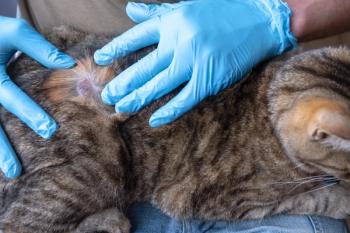
Johnston sets standard of women in academia
Ask Dr. Shirley Johnston to describe her life's successes, and her roles as a wife and mother immediately come to mind.
Ask Dr. Shirley Johnston to describe her life's successes, and her roles as a wife and mother immediately come to mind.
But while domestic attributes help define the 58-year-old veterinarian, they fall short of chronicling the life of a woman who embodies the future for women in academia. In an age when experts suggest the number of women equal men in most fields of veterinary medicine, Johnston remains the nation's first and only female veterinary college dean, running Western University of Health Sciences' (WesternU) DVM program in Pomona, Calif.
If it weren't for being a woman, Johnston's veterinary career might not have happened, she says.
"The first thing I remember about wanting to be a veterinarian was when I was a freshman undergrad in the fall of 1963," Johnston says. "At the time, I wanted to go to medical school, and even though I graduated at the top of my high school class, my advisor told me I would never get in because I was a woman. I didn't perceive any gender challenges in veterinary school."
A pioneer
More than 40 years later, Johnston acknowledges the error of her early observation. Although gender no longer determines success in veterinary medicine, Johnston notes women still are not thriving in academic leadership positions.
She first observed gender-based inequities while teaching at the University of Minnesota (UM)'s veterinary college, where a legal ruling levied against the institution involving sexual discrimination mandated across-the-board increases in the salaries of female faculty.
"The men were being paid more, and the university was forced to remedy that," she says. "Afterward, I became interested in why there weren't more female leaders, and I became interested in the communication styles of men and women."
Distinguished career
Johnston's road to leadership began at a time when women far from dominated the profession. After graduating with a DVM degree in 1974 from Washington State University (WSU), Johnston joined the staff at UM and earned a master's degree from the institution in 1977. She followed with a doctorate in theriogenology in 1981, and became a diplomate of the American College of Theriogenologists in 1980.
During her tenure at UM, Johnston was appointed to associate dean for Academic Affairs and took part in a search committee for a vice president of health sciences.
"I was amazed to learn that out of 130 medical schools, there were no female deans and very few department heads," she says. "I was probably in my 40s at the time, and I looked around to realize there were so few women in leadership positions. That bothered me because I believe organizations are the strongest when they have representative leadership."
Johnston left UM in 1996, when her alma mater offered the educator a chairing position at WSU's Department of Veterinary Clinical Sciences. Johnston, who's from Seattle, thought she was going home to plan retirement.
Two years later, consultants touting a new veterinary medical program came calling. At the time, Johnston wasn't interested.
Making history
"A friend of mine, Dr. Billy Hooper was a consultant who talked me into going to California to see the curriculum on this new veterinary school at a very small nonprofit university," Johnston says. "I was content in Washington, but once I saw the plans, I realized, having worked in large state institutions all my life, that this move would allow me to affect change in a way I couldn't at a big school. They wanted me to be dean."
In 1998, Johnston accepted, and WesternU's veterinary medical program was born.
Following her decision, Johnston moved her family to Pomona, Calif., and started developing policies and positions for the nation's 28th veterinary college. Reaction in the profession was mixed.
Setbacks
The Council on Education (COE), a national accrediting body under the American Veterinary Medical Association's umbrella, wasn't pleased with proposed curriculum and facilities plans. That came as a shock to university leaders because Hooper, hired by the university to write its curriculum, once ranked as COE chair. In 2001, the clash between AVMA and WesternU prompted the institution to draw up a multi-million dollar lawsuit that was dropped when it became clear accreditation was moving ahead.
Johnston admits that hurdle came as a surprise.
"I thought my challenges would be raising money, recruiting good faculty and students," she says. "I didn't think for a moment about accreditation. It caused us to delay the admission of our first class from 2001 to 2003. There were times when I didn't think the school would make it."
The road ahead
Now that it has, Johnston sits at the table with deans from other veterinary institutions twice a year. As the lone woman in the group, she says her colleagues are "cordial and nice," but sometimes Johnston can't help but feel "a little marginalized."
"I do perceive that, but I also understand that I'm new and have a huge challenge ahead of me," she says. "It's not a small task to build a veterinary college."
One such challenge includes raising funds for the new program. It's a source of pride for the academic leader.
"Fundraising is like kissing all the frogs before you get to the prince," Johnston says. "But I must say, what I feel best about in my career is bringing other women along. I love coming to work every day. My defining moment, I think, will be attending our first graduating class in three years."
Newsletter
From exam room tips to practice management insights, get trusted veterinary news delivered straight to your inbox—subscribe to dvm360.




